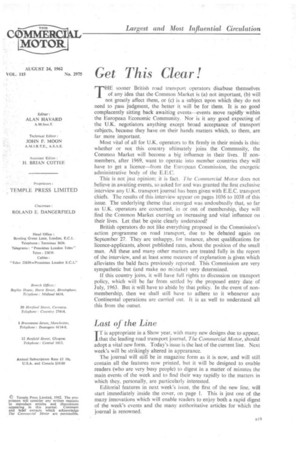Get This Clear!
Page 23

If you've noticed an error in this article please click here to report it so we can fix it.
THE sooner British road transport operators disabuse themselves of any idea that the Common Market is (a) not important, (b) will not greatly affect them, or (c) is a subject upon which they do not need to pass judgment, the better it will be for them. It is no good complacently sitting back awaiting events—events move rapidly within the European Economic Community. Nor is it any good expecting of the U.K. negotiators anything except broad acceptance of transport subjects, because they have on their hands matters which, to them, are far more important.
Most vital of all for U.K. operators to lix firmly in their minds is this whether or not this country ultimately joins the Community, the Common Market will become a big influence in their lives. If nonmembers, after 1969, want to operate into member countries they will have to get a licence—from the European Commission, the energetic administrative body of the E.E.C.
This is not . just opinion; it is fact. The Commercial Motor does not believe in awaiting events, so asked for and was granted the first exclusive interview any U.K. transport journal has been given with E.E.C. transport chiefs. The results of this interview appear on pages 1036 to 1038 of this issue. The underlying theme that emerged was undoubtedly that, so far as U.K. operators are concerned, in or out of membership, They will find the Common Market exerting an increasing and vital influence on their lives. Let that be quite clearly understood!
British operators do not like everything proposed in the Commission's action programme on road transport, due to be debated again on September 27. They are unhappy, for instance, about qualification's for licence-applicants, about published rates, about the position of the small man. All these and many other matters are treated fully in the report of the interview, and at least some measure of explanation is given which alleviates the bald facts previously reported. This Commission are very sympathetic but (and make no mistake) very determined.
If this country joins, it will have full rights to discussion on transport policy, which will be far from settled by the proposed entry date of July, 1963. But it will have to abide by that policy. In the event of nonmembership, then we shall still have to adhere to it whenever any Continental operations are carried out. It is as well to understand all this from the outset.
Last of the Line
IT is appropriate in a Show year, with many new designs due to appear, that the leading road transport journal, The Commercial Motor, should adopt a vital new form. Today's issue is the last of the current line. Next week's will be strikingly altered in appearance.
The journal will still be in magazine form as it is now, and will still contain all the features now printed, but it will be designed to enable readers (who are very busy people) to digest in a matter of minutes the main events of the week and to find their way rapidly to the matters in which they, personally, are particularly interested.
Editorial features in next week's issue, the first of the new line, will start immediately inside the cover, on page I. This is just one of the many innovations which will enable readers to enjoy both a rapid digest of the week's events and the many authoritative articles for which the journal is renowned.








































































































